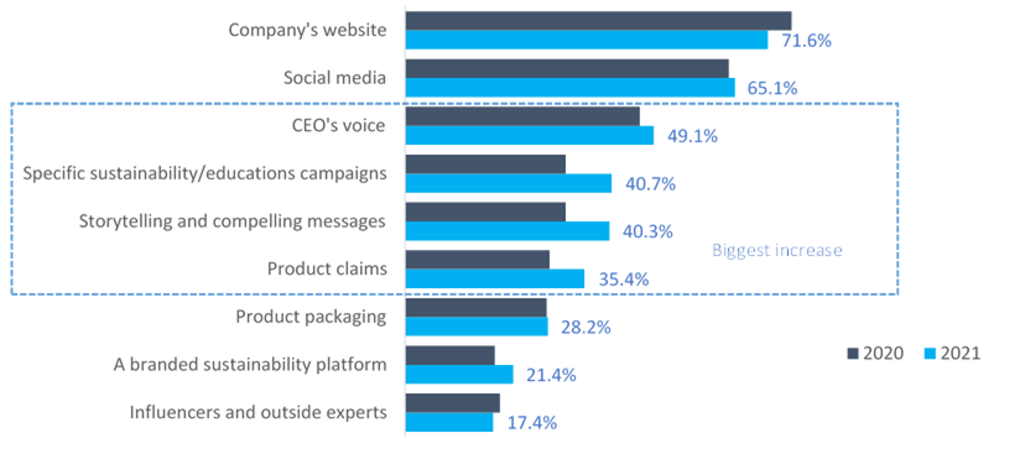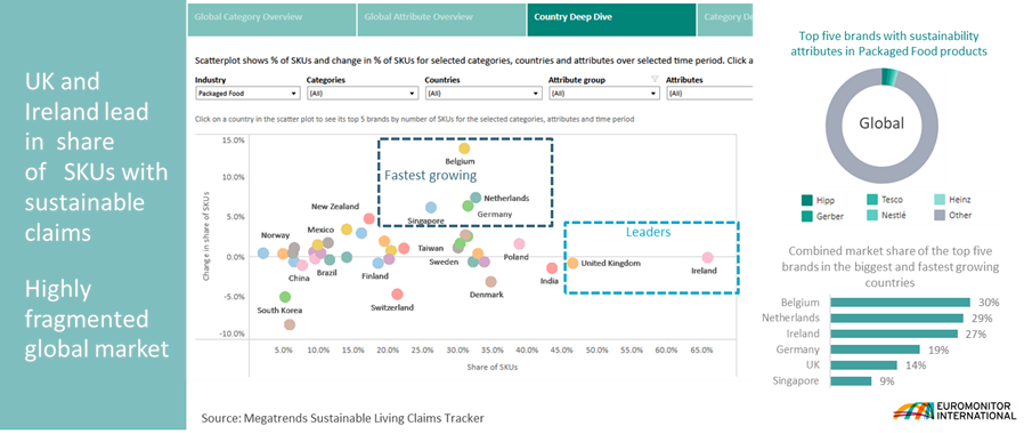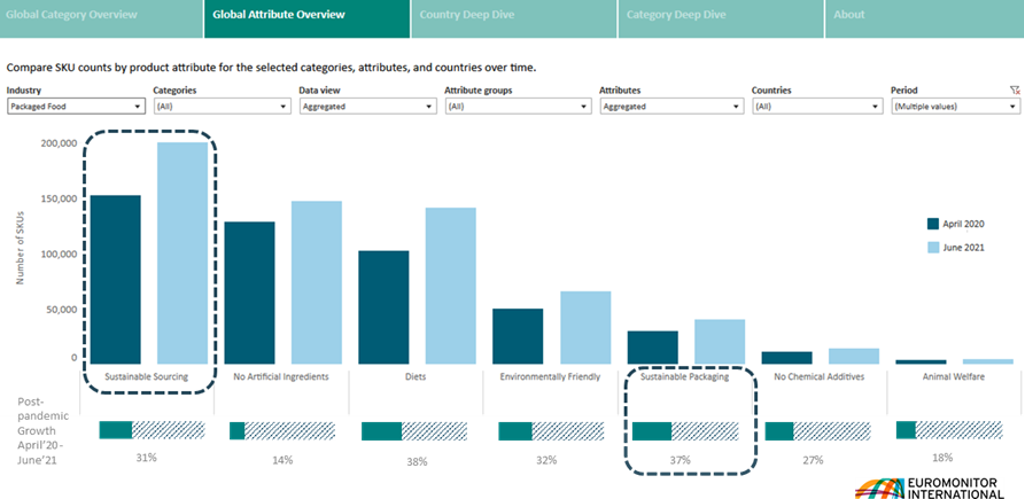Tracking Sustainability Claims: Where to Play and How to Win
While 60% of consumers in Euromonitor International’s Voice of the Consumer Lifestyles Survey 2021, stated that they feel they can make a difference in the world through their choices and actions, just over 10% of businesses communicated sustainability information successfully with them according to Euromonitor International’s Voice of the Industry Sustainability Survey, 2021. Understanding how to connect and resonate with consumers and where to play and how to win in markets where the shift from traditional to sustainable purchases is occurring, is key to capitalising on these opportunities while contributing to sustainable development.
Claims are increasingly used to communicate sustainability
Having a purpose and being sustainable is important, but communicating sustainability effectively is equally as necessary. There is no one-size-fits-all strategy, and therefore companies are trying to connect with consumers through a combination of approaches. Most businesses use their website and social media for this purpose, and increasingly companies are using the voice of the CEO to deliver sustainability messages.
Using storytelling, campaigns, and product claims to communicate sustainability with consumers is gaining traction. Telling the story behind a product claim is critical to connect and resonate with the target audience. Stories gain consumers’ attention, generate emotions, and make products, companies and brands stand out from competitors. There is nothing more powerful than the right claim with a meaningful and compelling story and sustainability is possibly one of the most important stories that a company or a product can tell today.
Corporate communication strategies

Sustainable Living Claims Tracker provides clear global comparisons and insight
Euromonitor International has introduced a new tool that tracks stock keeping units (SKUs) with sustainability attributes in the beauty and personal care and packaged food industries across 40 countries and covers more than 1,000 retailers and over 30,000 brands. The tracker uses data from Euromonitor International’s e-commerce intelligence tool Via in addition to other sources to track the number of SKUs sold online that have product claims and other attributes related to sustainability across seven areas: Animal Welfare, Diets, Environmentally Friendly, No Artificial Ingredients, No Chemicals, Sustainable Packaging and Sustainable Sourcing.
While global demand for products with sustainability claims is rising, each market has its own opportunities and barriers that companies need to consider when planning for or adjusting their strategies to decide which products to launch, as well as “where” and “how” to present them to consumers.
Understanding “where to play” with sustainability claims
When companies are deciding where to play, it is critical to ensure that they are planning a strategy based not just on where markets are with regards to sustainable products, but also understanding the direction countries are moving in to help keep abreast of key consumer drivers. To assess this, it is essential to track, monitor, and analyse two key metrics; the first one measures the prevalence of SKUs with sustainability claims across markets, and the second one tracks how these claims change in these markets over time.
With the highest percentage of SKUs with sustainability claims in packaged food, Ireland and the UK are well-established markets where companies use claims to communicate sustainability across a variety of product categories. Post-pandemic (from March 2020 to June 2021), European countries such as Belgium, Netherlands and Germany alongside Singapore witnessed strong increases in sustainability claims as a percentage of total products available.
Tracking sustainability claims in packaged food: Country overview 
In addition to identifying the growing and most prevalent markets, companies must continue to drill down into the specific claims as well as product categories that are driving these dynamic markets to identify further opportunities.
Identifying “how to win” by tracking specific sustainability claims
Sustainability claims are increasingly becoming part of the purchasing experience for consumers, but due to the limited space on packaging or a product’s description to communicate core sustainability values and messages to potential customers, companies need to prioritise which claims resonate better with consumers and how fast these claims are proliferating for distinct time periods.
Monitoring which sustainable claims are catching on and proliferating in different markets is an additional resource for decision making across all business units, from procurement and research and development to consumer insights, marketing and communication teams.
With nearly 190,000 SKUs, sustainable sourcing is the leading claim category for sustainable living in packaged food. While being the largest group, it also experienced strong growth during the post-pandemic period, growing by 31% between March 2020 and June 2021. One other group with strong post-pandemic growth is sustainable packaging claims which saw an increase of 37% in the number of SKUs in the same period. This is an important group of claims that not only resonates with a growing number of consumers but is also important for the food and beverage industries which are responsible for over 90% of all plastic packaging placed on the global retail market.
Tracking sustainability claims in packaged food: Global attribute overview 
Brands need to understand the dynamics of product claims related to sustainability across different markets, alongside a product’s price positioning and how consumers are reacting to sustainability claims. This information combined helps adapt and innovate product portfolios, make decisions about claims prioritisation and tailor communication strategies.
The Sustainable Living Claims Tracker will be part of Euromonitor International’s new sustainability tool to be launched in 2022. It will track the sustainability sentiment and action from consumers, companies, as well as product claims and the wider environmental and socio-economic landscape of key markets.
For more information, please watch the on-demand webinar Understanding Sustainable Living Through Product Claims and if you are interested in learning more about sustainability and product claims, please get in touch with Maria Coronado Robles Sustainability Insights Senior Manager and Jared Conway, Head of research.

